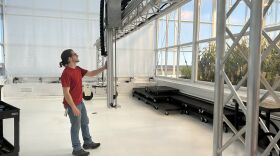
Lily Burton
Science Reporting Fellow, American Association for the Advancement of ScienceLily Burton reports on science as the 2024 AAAS Mass Media Fellow at WUNC. She is a PhD candidate in Biochemistry and Molecular Biophysics at the University of Chicago and has written for Microbites, Science Unsealed and The Forefront, covering everything from machine learning to stories of patients surviving cancer. She also works with organizations like ComSciCon to host events for grad students in STEM fields to develop their science communication skills.
-
TikTok offers a window into patient experience for physician researchers. But they caution patients to be skeptical of 'Dr. TikTok'
-
Rare earth elements power everything from smartphones to wind turbines. Mining them creates toxic waste. NC State researchers are exploring an alternative that taps into existing toxic waste instead.
-
Colossal Biosciences is working to “de-extinct” the wooly mammoth, the Tasmanian tiger, and the dodo. They hope their work will be part of slowing down and reversing the massive extinction that we’re living through currently.
-
Researchers have uncovered information about a major extinction during the Jurassic period that they believe sheds light on how climate change affects our oceans. Jeff Tiberii talks with a Duke researcher about the discovery.
-
Due South co-host Leoneda Inge talks with an NC State researcher about the discovery of the new dinosaur species Fona herzogae, which are believed to have lived at least some of their lives in underground burrows.
-
NC biotech company Humacyte will receive an FDA decision this week that will determine whether their engineered tissue product can be made available for widespread use.
-
Co-host Leoneda Inge talks with an NC State researcher about the discovery of the new dinosaur species Fona herzogae, which are believed to have lived at least some of their lives in underground burrows.
-
A team of residents and scientists in eastern North Carolina is using an unlikely tool to look for clues about air pollution.
-
Fireflies can live in human spaces more easily when there’s less artificial light and more leaf litter.
-
Researchers at North Carolina State University are building a database of plant images to train future AI tools for agriculture.









